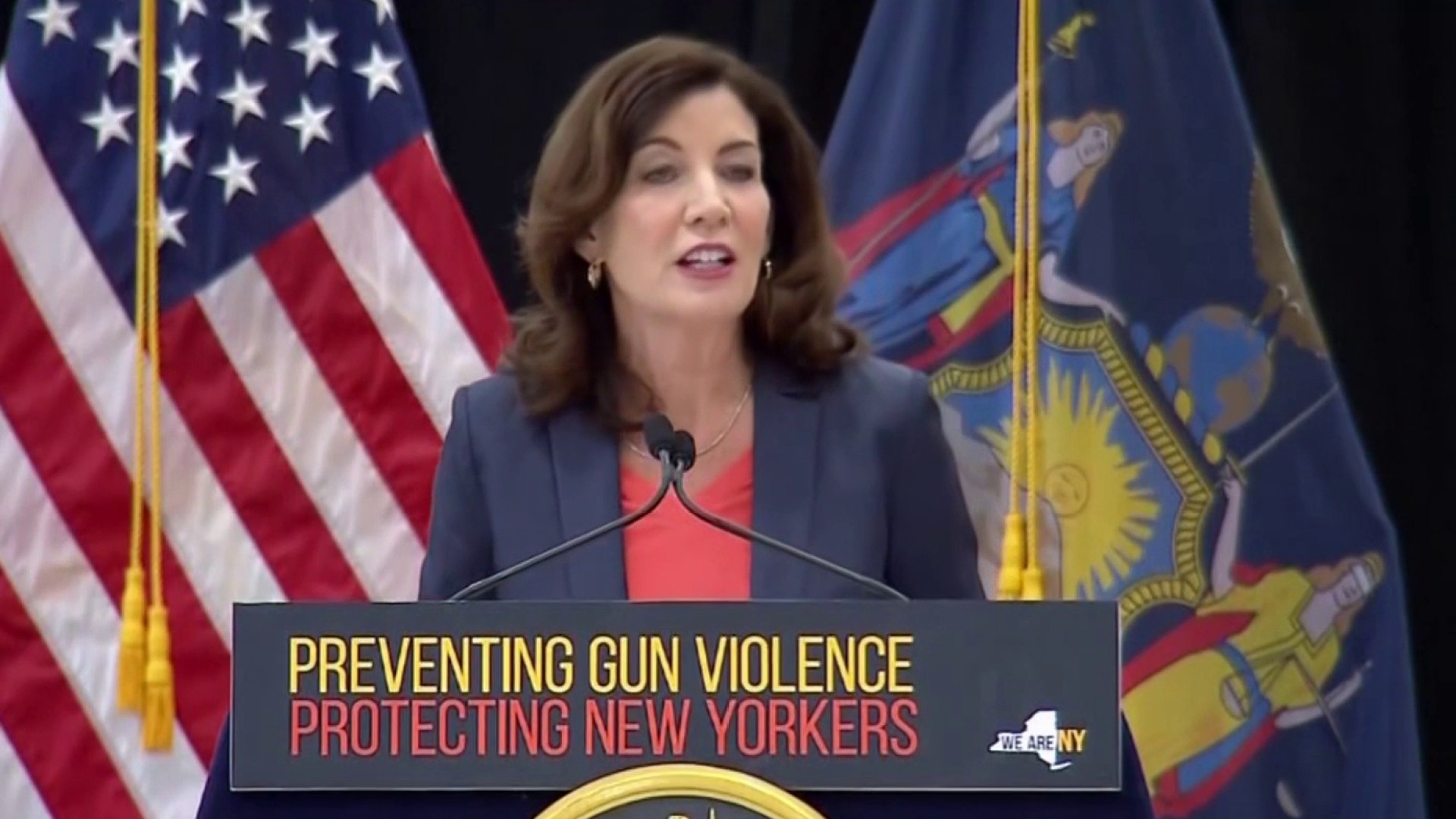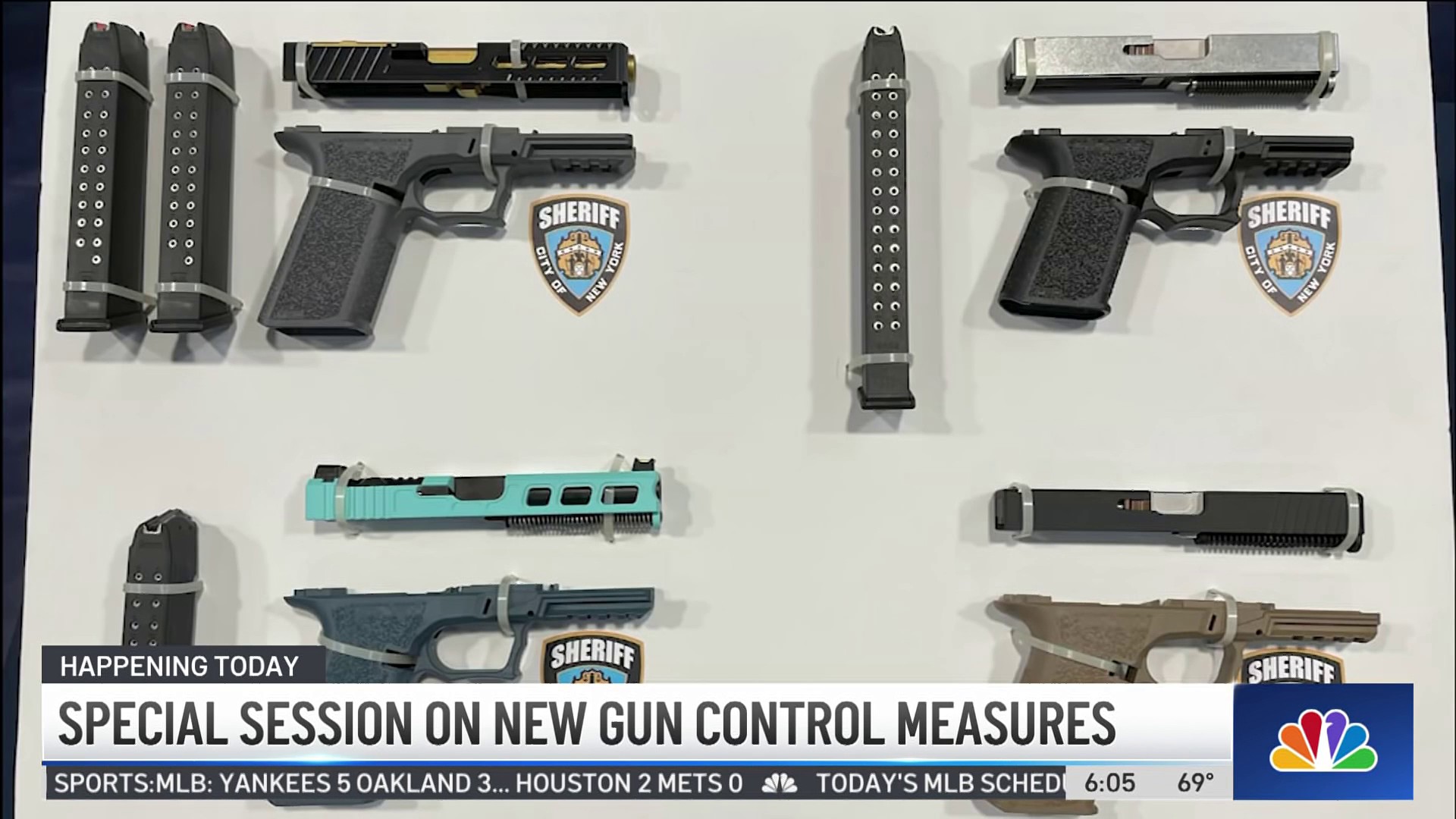The U.S. Supreme Court’s strikedown of New York state’s concealed carry law in late June unleashed an immediate fury of fiercely divided reactions. Democratic Gov. Kathy Hochul signed, in short order, a state law to preserve some firearms limits, especially in “sensitive areas,” in the wake of that ruling. Times Square quickly emerged as a hot button of the debate.
More than two months later, it very much remains a focus in New York City.
Should the entirety of the Crossroads of the World be considered a “sensitive area,” meaning it could have special concealed carry rules, under the new law? That’s what the language indicated in Hochul’s bill. But it begs another question. If all of Times Square is “a sensitive area,” what exactly is Times Square? Defining the borders becomes a critical task from a legal perspective in the gun control fight, and that’s the topic that headlined a New York City Council meeting on Tuesday.
While the ramifications of the Supreme Court decision have far wider impact than Times Square, the change — and the state response to it — specifically impacts people who live and work in that area. And those familiar with New York City know neighborhood boundaries, even what constitutes Times Square, can be quite subjective depending on whom you ask.
Here’s what is set for sure:
- Times Square will be a sensitive gun zone starting Thursday. If you live or work there and have a license to carry, you can still carry a gun. You need to have it in a lockbox, whether you’re walking or driving, at any point that you are within the sensitive zone.
- If you don’t follow those rules or you’re not licensed to carry and are caught with a gun, you face a class E felony.
The full New York City Council needs to vote on the boundaries because the state law left it up to the city to define Times Square. It’s not clear when the final vote will come. Large “GUN FREE ZONE” signs are already going up at all entry and exit points, and whatever ends up falling within the sensitive area realm will be under the purview of NYPD enforcement.
Here’s how the state legislation defined the boundaries of Times Square:
- The tract in Manhattan including and bounded on the west by the west side of Eighth Avenue, on the south by the south side of West 40th Street, on the east by the east side of Sixth Avenue, and on the north by the north side of West 53rd Street; and
- The tract in Manhattan including and bounded on the west by the west side of Ninth Avenue, on the south by the south side of West 40th Street, on the east by the east side of Eighth Avenue, and on the north by the north side of West 48th Street.
- The area commonly known as Times Square does not include the interior of any building or other enclosed structure; provided, however, that such a building or structure may otherwise constitute a restricted or sensitive location pursuant to penal law
New NY Gun Control Law Takes Effect Thursday
The measure passed both state legislative chambers by wide margins and earned Hochul’s signoff on July 1. Gun rights advocates accused the state of putting still too many restrictions on who can get guns and where to carry them. People supporting more aggressive control said the law strikes the right balance between complying with the Supreme Court ruling and keeping weapons out of the hands of people likely to use them recklessly or with criminal intent, especially when it comes to global landmarks.
More court challenges are still likely.
Among other things, the state’s new rules will require people applying for a handgun license to turn over a list of their social media accounts so officials could verify their “character and conduct.”
Applicants will have to show they have “the essential character, temperament and judgment necessary to be entrusted with a weapon and to use it only in a manner that does not endanger oneself and others.”
As part of that assessment, applicants have to turn over a list of social media accounts they’ve maintained in the past three years.
People applying for a license to carry a handgun also have to provide four character references, take 16 hours of firearms safety training plus two hours of practice at a range, undergo periodic background checks and turn over contact information for their spouse, domestic partner or any other adults living in their household.
Hochul’s chief lawyer, Elizabeth Fine, insisted earlier this summer the state was setting out “a very clear set of eligibility criteria” and noted that the legislation includes an appeals process.
The measure Hochul signed also fixed a recently passed law that barred sales of some types of bullet-resistant vests to the general public. The previous law inadvertently left out many types of body armor, including the type worn by a gunman who killed 10 Black people in a racist attack on a Buffalo supermarket earlier this year.
The Supreme Court’s ruling in June struck down a 109-year-old state law that required people to demonstrate an unusual threat to their safety to qualify for a license to carry a handgun outside their homes. That restriction generally limited the licenses to people who had worked in law enforcement or had another special need that went beyond routine public safety concerns.
Under the new system, the state won’t authorize permits for people with criminal convictions within the past five years for driving while intoxicated, menacing or third-degree assault.
Apart from Times Square, the state’s list of “sensitive areas” includes schools, universities, government buildings, places where people have gathered for public protests, health care facilities, places of worship, libraries, public playgrounds and parks, daycare centers, summer camps, addiction and mental health centers, shelters, public transit, bars, theaters, stadiums, museums, polling places and casinos.
New York will also bar people from bringing guns into any business or workplace unless the owners put up signs saying guns are welcome — a reverse approach from many other states where businesses that don’t want guns in their shops are usually required to post signs expressly forbidding them. Failure to heed such signs may result in felony charges.
Sign up for our Breaking newsletter to get the most urgent news stories in your inbox.



0 Comments